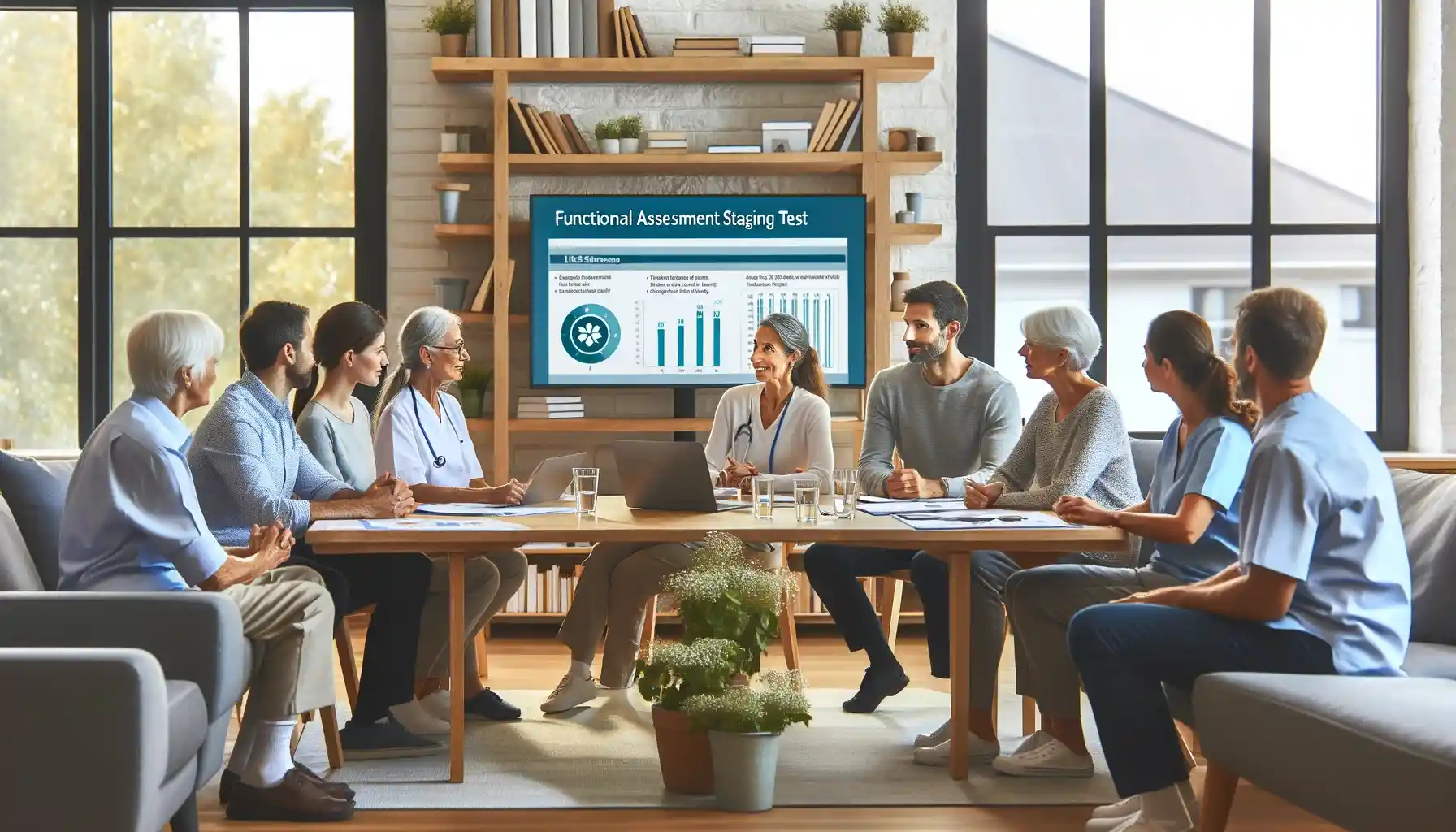The Functional Assessment Staging Scale In Hospice
The Functional Assessment Staging Scale (FAST) is a screening test to quantitatively assess the degree of disability and to document changes that occur over time. A FAST score in hospice is not intended to serve as the sole criterion for diagnosing dementia or to differentiate between various forms of dementia.

According to the National Hospice & Palliative Care Organization’s Medical Guidelines, patients classified as Stage Seven of the FAST are those who are considered end stage and appropriate for hospice. Even severely demented patients may have a prognosis of up to two years.
Survival time depends on variables such as the incidence of co-morbidities and the comprehensiveness of care. The FAST has scores which have been correlated with scores on the Mini Mental State Examination (MMSE). It is therefore a useful tool to support findings of the FAST scale.
Understanding FAST Dementia Staging in Hospice Care
The Functional Assessment Staging Test (FAST) is a crucial tool in hospice care for evaluating the progression of dementia in patients. This scale is specifically designed to:
- Quantify Dementia Progression: It measures the decline in dementia patients, providing a standardized way to document changes over time. FAST criteria dementia provides a systematic approach to evaluate and document the functional abilities of patients with dementia in hospice settings.
- Assess Eligibility for Hospice: Particularly at Stage 7 of FAST, which indicates advanced dementia, patients may be considered for hospice care.
- Guide Care Planning: Understanding a patient’s FAST score helps create a personalized care plan that addresses their specific needs at different stages of dementia.
- Monitor Disease Progression: Regular assessment with the FAST scale allows caregivers to observe the rate of decline, which is crucial for managing the patient’s symptoms and quality of life.
By effectively using the FAST scores, hospice care providers can better support patients with dementia, ensuring that their care is compassionate and appropriate to their stage of illness.

When is the FAST to be Completed in Hospice Care?
The FAST should be completed on admission of any patient with Dementia/Alzheimer’s Disease as the primary or secondary diagnosis. This should be documented on the Dementia Clinical Summary.
- For each Dementia/Alzheimer’s patient for each re-certification period. The score is to be documented on the Dementia Clinical Summary.
- Anytime a patient’s cognitive function would be considered a prognostic indicator for survival or anytime there are significant changes in status. The score is then documented in the clinical note.
- The FAST may also be completed for patients who have a coexisting cognitive impairment which may impact quality of life and survival. The score is then documented in the clinical note.

CONTINUA LEARNING
Simplify Your Hospice Team’s Training and Skill Building
A complete solution for your agency: more than 125 hospice courses, caregiver in-services, training plans, and more.
How to complete the FAST assessment in Hospice Care
- Nurses, psychosocial professionals, and physicians may complete the FAST assessment.
- Review FAST form and annotated guidelines for scoring (see below).
- Based on interview with patient/caregivers and observation, identify the highest consecutive level of disability based on guidelines.
- Document score on the Dementia Clinical Summary.

Functional Assessment Staging Test
The Reisberg FAST scale is a widely recognized dementia scale used to assess functional decline in Alzheimer’s patients. Following the admission process, when possible, the same health care provider should administer the scale on subsequent evaluations.
The tool “Typical Time Course of Alzheimer’s Disease” is a helpful reference to use once the FAST score has been established. Once the score has been determined, score placement on the tool can help to identify the usual time course of the disease and progression towards death. The “Typical Time Course of Alzheimer’s Disease” tool is only a reference and does not need to be completed or included in documentation.
Functional Assessment Staging Test (FAST)
- No difficulty either subjectively or objectively.
- Complains of forgetting location of objects. Subject work difficulties.
- Decreased job functioning evident to co-workers. Difficulty in traveling to new locations. Decreased organizational capacity.*
- Decreased ability to perform complex tasks, e.g., planning dinner for guests, handling personal finances (such as forgetting to pay bills), difficulty marketing, etc.
- Requires assistance in choosing proper clothing to wear for the day, season or occasion, e.g., Patient may wear the same clothing repeatedly, unless supervised.*
- a. Improperly putting on clothing without assistance or cueing (e.g., may put street clothes on overnight clothes, or put shoes on wrong feet, or have difficulty buttoning clothing) occasionally or more frequently over the past weeks.
b. Unable to bathe properly (e.g., difficulty adjusting bath-water temperature) occasionally or more frequently over the last weeks.
c. Inability to handle mechanics of toileting (e.g., forgets to flush the toilet, does not wipe properly or properly dispose of toilet tissue) occasionally or more frequently over the past weeks.
d. Urinary incontinence (occasionally or more frequently over the past weeks)*.
e. Fecal incontinence (occasionally or more frequently over the past weeks)*. - a. Ability to speak limited to approximately a half a dozen intelligible different words or fewer, in the course of an average day or in the course of an intensive interview.
b. Speech ability is limited to the use of a single intelligible word in an average day or in the course of an intense interview (the person may repeat the word over and over).
c. Ambulatory ability is lost (cannot walk without personal assistance).
d. Cannot sit up without assistance (e.g., the individual will fall over if there are not lateral rests (arms) on the chair).
e. Loss of ability to smile.
f. Loss of ability to hold head up independently.

Using the FAST Score Dementia Calculator in Clinical Practice
The FAST score dementia calculator is an invaluable tool for clinicians in assessing the progression of dementia. In clinical practice, it is used to:
- Determine Stage of Dementia: By inputting observable symptoms, the calculator helps in accurately staging the patient’s dementia based on the FAST criteria.
- Facilitate Care Decisions: The calculated FAST score guides healthcare professionals in making informed decisions about the level of care and interventions needed.
- Track Disease Progression: Regular use of the FAST score calculator enables clinicians to monitor the progression of dementia over time, aiding in adjusting care plans as the patient’s condition evolves.
This tool enhances the ability of clinicians to provide tailored and proactive care, ensuring that interventions are aligned with the patient’s current stage of dementia.
FAST Score in Hospice Decision-Making
The FAST (Functional Assessment Staging Test) score plays a pivotal role in hospice decision-making. It helps clinicians determine the progression of a patient’s dementia and assess their eligibility for hospice care. This assessment is vital for tailoring the care plan to the patient’s specific needs.
Understanding how to assess, treat, and manage hospice patients during dying is essential in providing compassionate care. Consider hospice training online for you and your hospice team to learn hospice FAST score skills.
The Role of FAST Scale in Dementia Care within Hospice
In dementia care within hospice settings, the FAST scale is an essential tool. It provides a systematic approach to evaluate the stages of dementia, aiding in the development of appropriate care strategies for patients in their advanced stages.
FAQ
What is FAST 7 Criteria for Hospice?
FAST 7 criteria refer to the seventh stage of the FAST scale, indicating severe dementia, often used as a guideline for hospice eligibility. This stage is characterized by significant cognitive and functional decline, necessitating comprehensive care.
How is the FAST Scale for Alzheimer’s Used in Hospice?
The FAST scale for Alzheimer’s helps in assessing the stage of dementia, guiding hospice care decisions and personalizing patient care. It allows for an understanding of the patient’s condition, helping to tailor interventions and support to their specific needs.
What is the Functional Assessment Staging Tool in Hospice Care?
The Functional Assessment Staging Tool (FAST) in hospice care is used to stage the progression of dementia. This tool is crucial for creating a focused and effective care plan tailored to the patient’s current cognitive and functional decline stage.
How is the FAST Score for Dementia Used in Hospice Settings?
In hospice settings, the FAST score for dementia is integral to evaluating dementia severity. This scoring system guides the hospice team in aligning care approaches with the patient’s evolving needs, ensuring compassionate and appropriate care.
References
Reisberg B. Functional assessment staging (FAST). Psychopharmacol Bull 24(4): 653-659, 1988.
